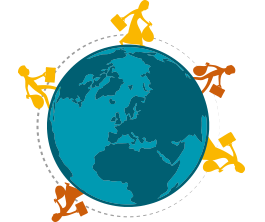Les individus souhaitent entrer dans l’UE pour diverses raisons et par différentes filières: regroupement familial, travail, affaires ou éducation, mais aussi pour échapper à l’oppression politique ou à la guerre. Les autorités nationales de l’UE doivent coopérer sur la gestion des frontières afin de garder nos frontières sûres. Elles ont également une responsabilité partagée pour le traitement équitable des demandeurs d’asile à travers l’UE. Un certain nombre de mécanismes de partage des informations - comprenant la collecte et l’échange d’informations sur des citoyens non membres de l’UE - occupent une place centrale dans leur coopération en matière de migration et d’asile.
